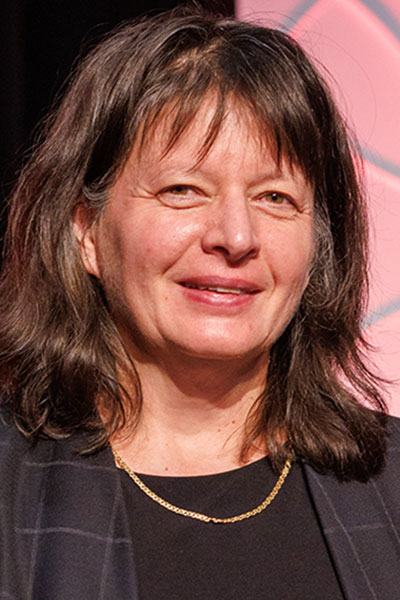
Kornelia Polyak, MD, PhD, gave an overview of her work on understanding the transition from ductal carcinoma in situ (DCIS) to invasive ductal carcinoma (IDC) in the 2023 AACR Distinguished Lectureship in Breast Cancer Research, supported by Aflac Inc., at the 2023 SABCS®.
“The transition from DCIS to IDC is a key step in immune escape and shapes tumor evolution,” said Dr. Polyak, who is a Professor of Medicine at Harvard Medical School. “By better understanding which cell types are important in this transition, we could develop better treatment strategies for advanced disease.”
The Thursday, December 7, session is available on demand for registered participants of the 2023 SABCS® through March 31, 2024, on the meeting platform.
This lectureship is an award that recognizes outstanding science that has inspired—or has the potential to inspire—new perspectives on the etiology, diagnosis, treatment, or prevention of breast cancer. Dr. Polyak was recognized for pioneering research in the role of the tumor microenvironment and intratumoral heterogeneity in breast cancer, which has increased the fundamental understanding of breast cancer tumorigenesis.
For the past 25 years, Dr. Polyak has worked to profile the different cell types involved in different stages of disease. Her group was the first to comprehensively profile distinct cell lineages of breast tissue in terms of gene expression from normal tissue and DCIS and IDC tumors. They found evidence for increasing immune suppression during the DCIS to IDC transition as well as high intratumor heterogeneity in DCIS.
But getting funding for this research wasn’t always easy.
“We thought that studying immune escape would help us better treat patients with advanced disease,” she said. “But we were rejected many times for this work. Because DCIS is not deadly, it wasn’t considered important.”
“Increasing data suggest that host immunity is relevant for cancer,” she said. “The immune system changes with age, and cancer is more common in older individuals.”
In a cohort of women with DCIS and untreated stage IV breast cancer, Dr. Polyak showed that higher peripheral T-cell diversity was associated with a higher risk of recurrence in patients older than 45 with DCIS.
Dr. Polyak is also interested in characterizing patient factors—such as age and pre-existing immunity—that impact tumor progression.
“Cancer is more than a tumor,” said Dr. Polyak. “We have to study the individuals and look beyond the tumor to find markers of progression. We are finding that the combination of age and T-cell diversity could influence risk of progression.”

